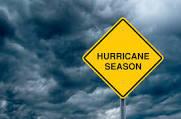Keep Prepared for Hurricane Season

Be informed and receive emergency alerts, Prepare for a major storm, Review Hurricane Preparedness Resources
Sign Up for Code Red Emergency Alerts
Visit the Dukes County Emergency Management website and view the MA Emergency Management Agency's Preparedness Brochure.
Go HERE to see key messages from the National Oceanic and Atmospheric Administration (NOAA) regarding current weather forecasts.
Go to the National Oceanic and Atmospheric Administration's (NOAA) National Hurricane Center's Current Forecast Information site for more information.
What Should I Do If There Is a Hurricane?
Before the Storm
The best way to protect yourself and your family from the effects of a hurricane is to be prepared.
Plan and practice evacuation routes. Your community may have a designated route, contact the local emergency management agency for details and the location of the shelters. Use these links during the hurricane for updated town specific information.
Chilmark Hurricane Information Page
Assemble a disaster supply kit - see FEMA recommendations for disaster supply kit at Ready.gov
Make arrangements for pets. It is the policy of shelters not to allow pets. You may want to contact animal boarding facilities or hotels for emergency information.
Protect your windows. Permanent shelters are the best protection, but plywood panels will also work.
Purchase flood insurance.
Develop an emergency communication plan. If family members get separated during a disaster it is helpful to have a friend or relative, outside the impacted area, who can be contacted and told everyone is ok.
During a Watch
Listen to radio and television for hurricane reports.
Check emergency supplies.
Fuel car.
Bring in objects such as toys or patio furniture. Anchor objects that cannot be brought inside.
Secure windows with shutters, boards or tape.
Store drinking water in clean bathtubs, jugs, bottles, etc.
Review evacuation plan.
Moor boats securely or remove them from the water.
During a Warning
Listen constantly to radio or television for updates and instructions.
If in a mobile home, evacuate immediately.
Store valuables in waterproof containers on high levels to avoid water damage from flooding.
Elevate furniture to protect it from water damage.
Stay inside, away from windows, skylights and glass doors.
If Evacuation is Necessary
Leave as soon as possible. Follow authorized evacuation routes.
Avoid flooded roads and watch for washed-out bridges.
Secure your home by unplugging appliances and turning off electricity and the main water valve.
Bring pre-assembled emergency supplies kit and warm protective clothing.
Lock up home and leave.
After the Storm
Stay tuned to local radio and television stations for information on returning to your home.
Return home only after authorities advise that it is safe to do so.
Help injured or trapped people.
Avoid loose or dangling power lines. Report them immediately to utility companies, police or the fire department.
Enter your home with caution.
Beware of animals, insects and snakes that may have entered your home in flood water.
Open windows and doors to ventilate and dry your home.
Check refrigerated foods for spoilage.
Take pictures of the house and damaged goods for insurance claims.
Drive only if necessary, rescue and maintenance crews need to be able to travel freely.
Use the telephone only for emergency calls.








